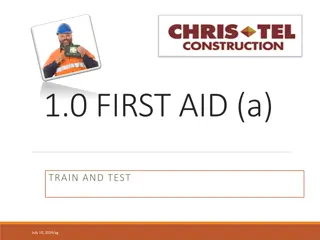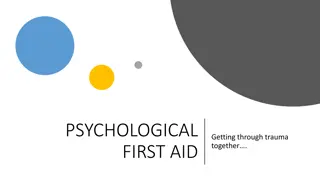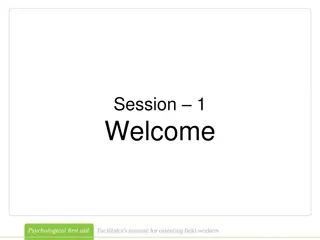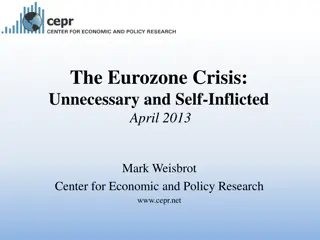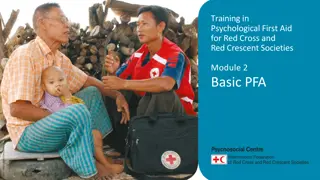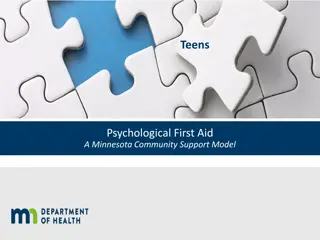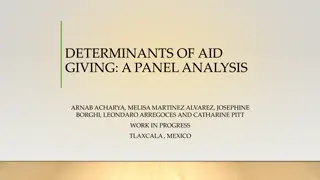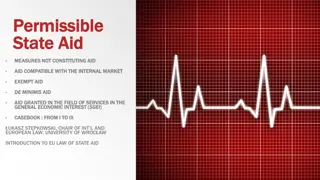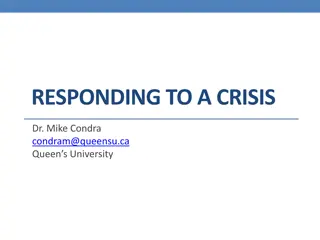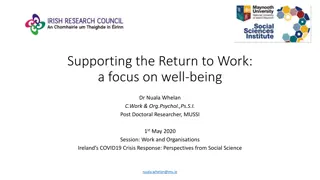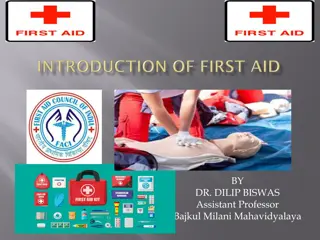Psychological First Aid: Supporting Individuals Through Crisis
Psychological First Aid (PFA) is a compassionate intervention aimed at stabilizing acute distress and facilitating continued care after a crisis. PFA focuses on meeting basic needs, stabilizing reactions, fostering resilience, and providing emotional support. Key components include comfort, protection, energy redirection, and re-establishing security. The approach emphasizes genuine care, approachability, and awareness of others' needs. Organizations like John Hopkins recognize the importance of mental health support post-disaster due to the prevalence of psychological distress.
Download Presentation

Please find below an Image/Link to download the presentation.
The content on the website is provided AS IS for your information and personal use only. It may not be sold, licensed, or shared on other websites without obtaining consent from the author. Download presentation by click this link. If you encounter any issues during the download, it is possible that the publisher has removed the file from their server.
E N D
Presentation Transcript
Psychological First Aid Recovering After a Crisis Supporting Through a Crisis Supporting Through a Crisis Jacquelyn Maser, MS LPC
PFA- WHAT IS IT? A supportive and compassionate presence designed to stabilize and mitigate acute distress, as well as facilitate access to continued care. Traumatic Stress is not mental illness. It is an ordinary reaction to an extraordinary event. Does not entail diagnosis and treatment Is a form of Crisis Intervention Can be traced back to WWI
If one is truly to succeed in leading a person to a specific place, one must first and foremost take care to find him where he is and begin there. -Kierkgaard, 1948/1998, p. 48
PFA Action of PFA are: Goals of PFA are: 1. Meet Basic Needs 2. Stabilize acute psychological/behavioral reactions 3. Assist in recovery of some degree of resiliency 4. Foster natural coping and resilience mechanisms 5. Facilitate access to continued support for higher level of care Comfort and consolation Physical Protection Provision of physical necessities Channeling energy into constructive behaviors Reuniting victims with families Behavioral/emotional support Allowing emotional ventilation Re establishing a sense of security Utilization of acute social and community support networks Referral for those in need (John Hopkins Model, 2017)
PFA Carl Rogers noted 3 things required to provide psychological support: 1. Two or more people need to be present and one needs to have less need for psychological support than the other at that moment in time. 2. The person with less need for psychological support needs to genuinely care about the other person whose need is greater. 3. The person with greater need for support must be aware that the other person cares. #1 Factor: Approachability: Friendly, trustworthy, authentic.
I dont like that man I must get to know him better. - Abraham Lincoln
John Hopkins Public Health perspective recognizes that in the wake of disaster, 3 dynamics would come into play: 1. Mental Health casualties would far outnumber physical casualties, depending on cause of disaster. 2. Psychological distress is potentially contagious 3. A distinct shortage of mental health clinicians available to provide psychological services means personnel outside of the mental health professions, such as educators and emergency services personnel need to be trained. Psychological First Aid, 2016) (The John Hopkins Guide to
PFA- Reaction Phases Hero Phase: Everyone bans together to help Honeymoon Phase: Appreciation of assistance efforts, community cohesion, camaraderie Disillusionment- Realizes magnitude of loss Reconstruction- Accept losses, builds new normal.
PFA- Contributing Factors Contributing Factors to Psychological Impact: Length of disaster # of deaths Extent of devastation Occurred with or without warning Unknown causation Management of disaster relief operation Quality of communication by officials Whether families are separated.
PFA- Stress Reactions Stress reactions often occur months after the event. Other stressors become more prevalent. Cognitive Reactions Difficulty processing information Difficulty in concentration, short term memory, thinking clearly and decision making. Emotional Reactions Anxiety Fear Depression Numbness Withdrawal Anger Irritability Physical Reactions Arousal of nervous system Gastrointestinal issues Increase in blood pressure, blood sugar and heart rate Sleep difficulties Suppression of the immune system. Behavioral Reactions Self medicate Increase in family trouble, abuse Avoidance, isolation Overprotective parents
PFA- Skills Support is often found in Silence. Buddhist approach to disaster psychology. Active listening or Wawokiya . I m all EARS. E- Encourage A- Ask ? s R- Reflect S- Summarize
PFA- Skills Help to identify acceptable responses to a problem: Change Situation Avoid Situation Tolerate Situation
PFA- SKILLS Evaluate for the need for professional help. Unpleasant symptoms last more than a month Difficult to function effectively in work, school, home Concern about behaviors or emotions You suspect person poses a risk to self or others You feel persons difficulties are uncomfortably beyond your skill level You are in need of as much or more psychological support than the person you are trying to help. **
PFA- SKILLS Dysfunction Hopelessness Confusion Suicidal thoughts Delusions Panic Attacks PTSD Immobilizing depression Affective numbing Aggression Excessive substance abuse Persistent avoidance Cessation of faith Chest pain, dizziness Change in cardiac or gastrointestinal function Distress Difficulty concentrating Reduced problem solving capacity Feeling overwhelmed/overloaded Anxiety Irritability Frustration Compulsions Sleep/Eat disturbance Easily Startled Questioning faith Headaches, stomach aches, muscle spasms Easily injured Frequent colds (decreased immunity) VS
PFA- Skills Self Care Self care is critical to remaining effective in supporting others through the lengthy process of recovery. Self Care Strategies Maintain a Routine Get adequate Sleep Exercise Eat healthy Support from Family and Friends Avoid self medicating Take Breaks It is common for people to want to push themselves until they drop organizing their own affairs or helping others. The problem with this strategy is that the ability to be effective steadily declines with prolonged continuous work hours. Efforts expanded become steadily less useful until a person s efforts may even be counterproductive and can even interfere with effective recovery. In addition, this constantly driven behavior may result in dangerous levels of physical and psychological stress on the individual. (Jacobs, 2016, p.83-85)
Everly, George S., & Lating, Jeffrey M. (2017). The John Hopkins Guide to Psychological First Aid. John Hopkins University Press. Jacobs, Gerard A. (2016) Community Based Psychological First Aid: A Practical Guide to Helping Individuals and Communities during Difficult Times. Elsevier.




